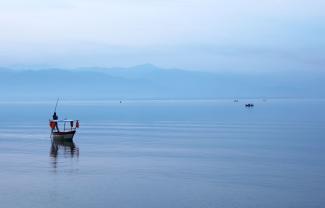Overfished water body
Uninforced fishing ban on world’s second deepest lake

Lake Tanganyika is the second deepest lake on Earth. It is the habitat of a large diversity of fish, many species of which do not exist elsewhere. Mukeke and Ndagala fish are among the most popular items of local cuisine.
The lake has been overfished. In order for stocks to recover, the governments of Burundi, Democratic Republic of the Congo, Tanzania and Zambia agreed to close the lake to fishermen for a lengthy period of time.
Burundi has 18 fishing beaches and several fishing ports. The country’s governments initially only wanted the fishing ban to go on for a week, but it did not prevail.
People whose livelihoods depend on the sector were afraid of the measure. Georges, for example, is a fisherman who normally sets sail from the southern town of Rumonge. The father of four has considered returning to his home in northern Burundi since he lacks an alternative source of income.
Claudette has two children. She normally earns money by selling Ndagala fish which she procures early in the morning at the port of Karonda. Her average income is equivalent to two or three euros per day. For her children, fish is the standard food. Claudette too wondered where she would find an alternative livelihood.
In early June, however, Burundi, the DRC and Tanzania are not enforcing the ban. No new date has been defined, but the ban has not been cancelled either. Life goes on as before – and so does overfishing. Zambia, by contrast, has stopped fishing temporarily.
Overfishing and pollution
The full truth is that fish production has been declining. In 2016, the total catch in Burundi was 26,000 tons. Three years later, the figure had dropped by 6000 tons. The number of fishermen is in decline too. Some have given up because of increased fishing levies. Exports have gone down accordingly. Gabriel Butoyi, who heads the association of Burundian fishermen and consumers, points out that production has not been keeping up with demand. One consequence is high prices, which make fish increasingly unaffordable for many families.
Relentless fishing and illegal equipment such as gillnets are at the root of the current problems. Water pollution is an issue too, as it kills fish and affects spawning areas. Agriculture and human settlements are expanding, adding to the problems. Environmentalists want Burundi’s water legislation to be enforced. It states that buildings must be at least 150 meters away from the lake and 50 meters away from rivers, but it is all too often breached.
Pisciculture on the rise
Fish farming is a sensible response to this crisis. In Lake Cohoha in northern Burundi, domestic and international investors have started breeding tilapia. The current production amounts to an annual 1000 tons.
Pisciculture is a growing sector in other regions as well. Aqua Burundi, a private company, specialises in sustainable practices. But it is challenging to process the fish, in view of lacking electric power and refrigeration. Smoking fish, however, requires a lot of firewood.
Burundians hope that fish stocks will recover, and production will increase once again. Without the lake closure, that is unlikely to happen. The supranational Lake Tanganyika Authority, which planned the fishing moratorium, has gone silent. Supra-national governance is clearly not working.
Burundians find the situation confusing. They are happy to be spared short-term hardship but worry about the long-term outlook.
Mireille Kanyange is a journalist who works for Radio Isanganiro in Burundi.
mika.kanyange@gmail.com







